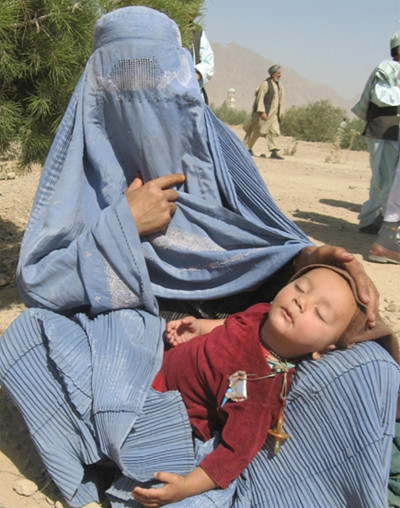Afghanistan’s anti-begging commission has arrested hundreds of beggars in Kabul in the past few months, but most are released if relatives guarantee they will not beg again, officials said.

The government outlawed street-begging in November 2008 (Photo: Abdullah Shaheen/IRIN)
The government outlawed street-begging in November 2008 and set up a commission - made up of different government bodies and the Afghan Red Crescent Society (ARCS) - to end street-begging in the capital.
“So far we have picked 706 beggars from the streets in Kabul [since January],” Nawroz Ali Alizada, director of ARCS’s welfare houses, told IRIN on 10 September, adding that most of those arrested were women, children, male drug addicts and people with disabilities.
The anti-begging commission says street-begging is linked to child abuse and prostitution.
Despite the arrests, many beggars are still plying their trade.
Afghanistan is the fifth least developed country, with 42 percent of its estimated 27 million people living on less than US$1 a day, according to the UN Development Programme.
However, some people beg for reasons beyond immediate survival, officials say: “Many of the beggars we pick up off the streets have fancy mobile phones and large amounts of cash in their pockets,” said Karima Salek, director of Kabul women’s affairs department and a member of the anti-begging commission.
At least two beggars interviewed by IRIN - an elderly woman and a seven-year-old boy - said they only just managed to survive. “Most of the time I am starving and ill,” the old woman said.
Addicts
Many of the beggars are young male drug addicts deported from Iran and Pakistan. “The number of addicted beggars is fast increasing and it’s very worrying,” said ARCS’s Alizada.
Over 145 addicted beggars have been referred to the Ministry of Public Health (MoPH) for treatment and rehabilitation but members of the anti-begging commission acknowledged shortcomings in the process.
“We need meaningful treatment and rehabilitation services for the addicted beggars, but the Health Ministry and partner NGOs only keep them for 10 days,” said Alizada.
However, MoPH spokesman Farid Raid insisted the ministry was doing a creditable job: “The MoPH in partnership with several supporting NGOs has been delivering essential services to treat and rehabilitate drug addicts.”
Database
The commission keeps a database of identification details (photo, address and ID cards) for each beggar, as well as details of his or her relatives, in a bid to thwart repeat offenders.
“If we find a recurring case we will refer it to the police for appropriate legal action because begging is illegal,” said Alizada.
Prior to release, beggars are held at an ARCS-sponsored centre where boarding and lodging facilities are available free of charge, but ARCS says it cannot afford to maintain the facility for much longer without an injection of donor funds.



